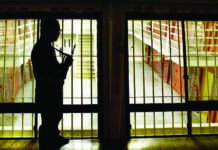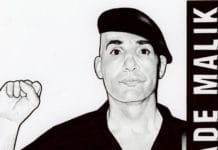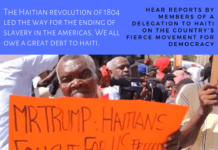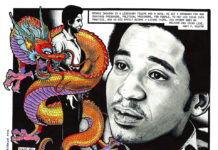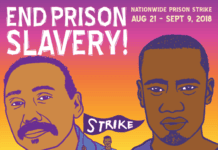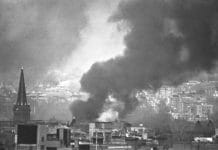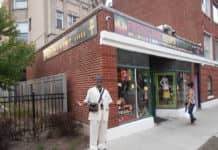by Kiilu Nyasha

On this 30th anniversary of Black August, first organized to honor our fallen freedom fighters, Jonathan and George Jackson, Khatari Gaulden, James McClain, William Christmas and the sole survivor of the Aug. 7, 1970, Courthouse Slave Rebellion, Ruchell Cinque Magee, it is still a time to embrace the principles of unity, self-sacrifice, political education, physical fitness and/or training in martial arts, resistance and spiritual renewal.
The concept, Black August, grew out of the need to expose to the light of day the glorious and heroic deeds of those Afrikan women and men who recognized and struggled against the injustices heaped upon people of color on a daily basis in America.
One cannot tell the story of Black August without first providing the reader with a brief glimpse of the “Black Movement” behind California prison walls in the ‘60s, led by George Jackson and W.L. Nolen, among others.
As Jackson wrote: “[W]hen I was accused of robbing a gas station of $70, I accepted a deal … but when time came for sentencing, they tossed me into the penitentiary with one to life. It was 1960. I was 18 years old. … I met Marx, Lenin, Trotsky, Engels and Mao when I entered prison and they redeemed me. For the first four years I studied nothing but economics and military ideas. I met Black guerrillas, George ‘Big Jake’ Lewis and James Carr, W.L. Nolen, Bill Christmas, Torry Gibson and many, many others. We attempted to transform the Black criminal mentality into a Black revolutionary mentality. As a result, each of us has been subject to years of the most vicious reactionary violence by the state. Our mortality rate is almost what you would expect to find in a history of Dachau. Three of us [Nolen, Sweet Jugs Miller and Cleve Edwards) were murdered several months ago [Jan. 13, 1969] by a pig shooting from 30 feet above their heads with a military rifle.” (“Soledad Brother: The Prison Letters of George Jackson”)
When the brothers first demanded the killer guard be tried for murder, they were rebuffed. Upon their insistence, the administration held a kangaroo court and three days later returned a verdict of “justifiable homicide.” Shortly afterward, a white guard was found beaten to death and thrown from a tier. Six days later, three prisoners were accused of murder, and became known as The Soledad Brothers.
“I am being tried in court right now with two other brothers, John Clutchette and Fleeta Drumgo, for the alleged slaying of a prison guard. This charge carries an automatic death penalty for me. I can’t get life. I already have it.”

A jailhouse lawyer, Magee had deluged the courts with petitions for seven years contesting his illegal conviction in ‘63. The courts had refused to listen, so Magee seized the hour and joined the guerrillas as they took the judge, prosecutor and three jurors hostage to a waiting van. To reporters gathering quickly outside the courthouse, Jonathan shouted, “You can take our pictures. We are the revolutionaries!”
Operating with courage and calm even their enemies had to respect, the four Black freedom fighters commandeered their hostages out of the courthouse without a hitch. The plan was to use the hostages to take over a radio station and broadcast the racist, murderous prison conditions and demand the immediate release of The Soledad Brothers. But before Jonathan could drive the van out of the parking lot, the San Quentin guards arrived and opened fire. When the shooting stopped, Jonathan, Christmas, McClain and the judge lay dead. Magee and the prosecutor were critically wounded, and one juror suffered a minor arm wound.
Magee survived his wounds and was tried originally with co-defendant Angela Davis. Their trials were later severed and Davis was eventually acquitted of all charges. Magee was convicted of simple kidnap and remains in prison to date – 46 years with no physical assaults on his record. An incredible jailhouse lawyer, Magee has been responsible for countless prisoners being released – the main reason he was kept for nearly 20 years in one lockup after another. Currently at Corcoran State Prison, he remains strong and determined to win his freedom and that of all oppressed peoples.
In his second book, “Blood in My Eye,” published posthumously, George Jackson noted: “Reformism is an old story in Amerika. There have been depressions and socio-economic political crises throughout the period that marked the formation of the present upper-class ruling circle and their controlling elites. But the parties of the left were too committed to reformism to exploit their revolutionary potential. … Fascism has temporarily succeeded under the guise of reform.” Those words ring even truer today as we witness a form of fascism that has replaced gas ovens with executions and torture chambers: plantations with prison industrial complexes deployed in rural white communities to perpetuate white supremacy and Black and Brown slavery.
The concentration of wealth at the top is worse than ever: One percent now owns more wealth than that of the combined 95 percent of the U.S. population; individuals are so rich their wealth exceeds the total budgets of numerous nations – as they plunder the globe in the quest for more.
“The fascist must expand to live. Consequently he has pushed his frontiers to the farthest lands and peoples. … I’m going to bust my heart trying to stop these smug, degenerate, primitive, omnivorous, uncivil – and anyone who would aid me, I embrace you.

On Aug. 21, 1971, after numerous failed attempts on his life, the state finally succeeded in assassinating George Jackson, then field marshall of the Black Panther Party, in what was described by prison officials as an escape attempt in which Jackson allegedly smuggled a gun into San Quentin in a wig. That feat was proven impossible, and evidence subsequently suggested a setup designed by prison officials to eliminate Jackson once and for all.
However, they didn’t count on losing any of their own in the process. On that fateful day, three notoriously racist prison guards and two inmate turnkeys were also killed, presumably by Jackson, who was shot and killed by guards as he drew fire away from the other prisoners in the Adjustment Center (lockup) of San Quentin.
Subsequently, six A/C prisoners were singled out and put on trial – wearing 30 pounds of chains in Marin Courthouse – for various charges of murder and assault: Fleeta Drumgo, David Johnson, Hugo L.A. Pinell (Yogi), Luis Talamantez, Johnny Spain and Willie Sundiata Tate. Only one was convicted of murder, Johnny Spain. The others were either acquitted or convicted of assault.
Pinell is the only one remaining in prison and has suffered prolonged torture in lockups since 1969. He is currently serving his 19th year in Pelican Bay’s SHU, a torture chamber if ever there was one. A true warrior, Pinell would put his life on the line to defend his fellow captives.
As decades passed, our Black scholars, like Mumia Abu-Jamal, learned of other liberation moves that happened in Black August. For example, the first and only armed revolution whereby Africans freed themselves from chattel slavery commenced in Haiti on Aug. 21, 1791. Nat Turner’s slave rebellion began on Aug. 21, 1831 (coincidence?), and Harriet Tubman’s Underground Railroad started in August. As Mumia stated, “Their sacrifice, their despair, their determination and their blood has painted the month black for all time.”
Let us honor our martyred freedom fighters as George Jackson counseled: “Settle your quarrels, come together, understand the reality of our situation, understand that fascism is already here, that people are dying who could be saved, that generations more will live poor butchered half-lives if you fail to act. Do what must be done; discover your humanity and your love in revolution.”
Kiilu Nyasha, Black Panther veteran, revolutionary journalist and Bay View columnist, hosts the TV talk show Freedom Is a Constant Struggle every Friday at 7:30 p.m. on SF Live, San Francisco cable channel 76. She can be reached at Kiilu2@sbcglobal.net.

 Store
Store



